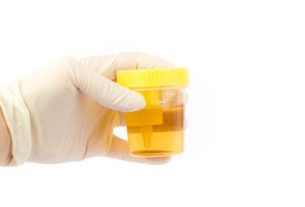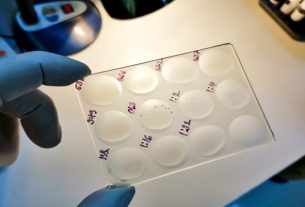Prolactin is a hormone produced by the pituitary gland that is responsible for stimulating the development of the mammary glands, promoting the production of milk in the breasts and regulating the menstrual cycle after childbirth.
Changes in prolactin levels can be seen in the case of excessive stimulation of the breasts or use of specific medications, for example, which can cause symptoms such as milk leakage from the breasts, infertility and decreased libido.
If changes in prolactin levels are suspected, it is recommended to consult an endocrinologist, and a prolactin test may be indicated to confirm whether this hormone is high or low in the blood.

What is it for
The main functions of prolactin in the body are:
- Stimulate the development of mammary glands;
- Promote milk production in the breasts after the baby is born;
- Regulate menstruation after childbirth, helping to avoid a new pregnancy during the breastfeeding period.
Furthermore, it is believed that prolactin also participates in regulating the body’s metabolism, influencing weight control, bone formation and hair growth, for example.
When to take a prolactin test
Prolactin testing is normally indicated when a person presents symptoms of high prolactin, such as irregular menstruation, milk leakage from the breasts in the absence of pregnancy or breastfeeding, infertility, decreased libido and, in men, erectile dysfunction or gynecomastia.
How to understand the result
In general, the reference values for prolactin in the blood are:
- Non-pregnant and non-breastfeeding women: 2.8 to 29.2 ng/mL;
- Pregnant women: 9,7 a 208,5 ng/mL;
- Postmenopausal women: 1.8 to 20.3 ng/mL;
- Men: below 20 ng/mL.
However, prolactin reference values may vary depending on the laboratory in which the test is carried out. Therefore, it is important to pay attention to the reference values indicated in the exam results.
Do you have questions about your exam results?
High prolactin in the blood can be caused by pregnancy, breastfeeding, physical exercise, breast stimulation or sexual intercourse, for example, and is not always considered a problem.
However, it can also be caused by hypothyroidism, use of antipsychotic medications, polycystic ovary syndrome or brain tumors, and it is important to identify the cause to begin appropriate treatment. Learn about other causes of high prolactin.
What can be low prolactin
Low prolactin can happen due to the use of some medications or changes in the functioning of the gland that produces this hormone, for example. However, low prolactin typically does not cause serious problems. Trust what low prolactin could be.
Bibliography
- KARACA, Z; UNLUHIZARCI, K; KELESTIMUR, F. Hypoprolactinemia. Does it matter? Redefining the hypopituitarism and return from a mumpsimus. Rev Endocr Metab Disord. 2023
- YOU AND YOUR HORMONES. Prolactin. Available at: <https://www.yourhormones.info/hormones/prolactin/>. Accessed on 24 Nov 2023
- HALL, John E. et al. Guyton & Hall Textbook of Medical Physiology. 13.ed. São Paulo – SP: Elsevier Editora Ltda, 2017.
- BERNARD, Valérie; YOUNG, Jacques; BINART, Nadine. Prolactin – a pleiotropic factor in health and disease. Nat Rev Endocrinol. Vol.15, n.6. 356-365, 2019
- UCSF. Prolactin blood test. Disponível em: <https://www.ucsfhealth.org/medical-tests/prolactin-blood-test>. Acesso em 24 nov 2023
- STATPEARLS. Hyperprolactinemia. 2023. Available at: <https://www.ncbi.nlm.nih.gov/books/NBK537331/>. Accessed on 24 Nov 2023
- MEDLINEPLUS. Prolactin Levels. Available at: <https://medlineplus.gov/lab-tests/prolactin-levels/>. Accessed on 24 Nov 2023
- CLEVELAND CLINIC. Prolactin. Available at: <https://my.clevelandclinic.org/health/articles/22429-prolactin>. Accessed on 24 Nov 2023
- STATPEARLS. Physiology, Prolactin. 2023. Available at: <https://www.ncbi.nlm.nih.gov/books/NBK507829/>. Accessed on 24 Nov 2023

Sign up for our newsletter and stay up to date with exclusive news
that can transform your routine!
Warning: Undefined array key "title" in /home/storelat/public_html/wp-content/plugins/link-whisper-premium/templates/frontend/related-posts.php on line 12
Warning: Undefined array key "title_tag" in /home/storelat/public_html/wp-content/plugins/link-whisper-premium/templates/frontend/related-posts.php on line 13



